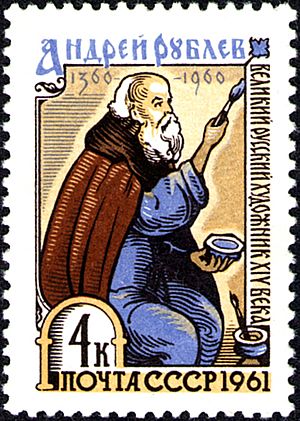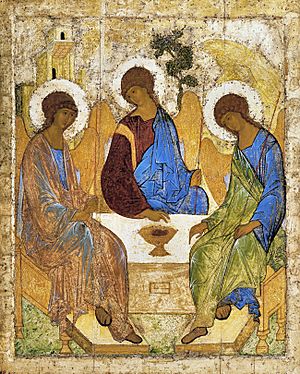Andrei Rublev facts for kids
Quick facts for kids St. Andrei Rublev |
|
|---|---|

anniversary stamp in 1961
|
|
| Venerable Father (Prepodobne) | |
| Born | 1360–1370 |
| Died | 29 January 1427 or 1430, or 17 October 1428 (aged 56–70) Andronikov Monastery, Moscow |
| Venerated in | Eastern Orthodox Church Anglican Communion |
| Canonized | 6 June 1988, Trinity-St. Sergius Lavra by 1988 Local Council of the Russian Orthodox Church |
| Feast | 29 January, 4 July |
| Attributes | Clothed as an Orthodox monk, often shown holding an icon |
Andrei Rublev was a very famous Russian painter. He lived in the Middle Ages, around the 1300s and 1400s. He is known for painting beautiful icons and frescos for the Eastern Orthodox Church. Icons are special religious paintings, and frescoes are paintings done directly onto walls or ceilings. Many people think he was one of the best artists of his time. He died in Moscow.
Contents
Andrei Rublev's Early Life
We don't know much about Andrei Rublev's early life. We don't even know where he was born. He probably lived at a monastery called Trinity-St. Sergius Lavra. This monastery is near Moscow. He lived there under a leader named Nikon of Radonezh.
The first time we hear about Rublev is in 1405. He was painting icons and frescos for a church. This church was the Cathedral of the Annunciation inside the Moscow Kremlin. He worked with two other famous artists, Theophanes the Greek and Prokhor of Gorodets. Rublev was the youngest and newest artist on this team. Theophanes was a very important artist from the Byzantine Empire. Many people believe he taught Rublev how to paint.
Andrei Rublev's Painting Career
Historical records tell us about more of Rublev's work. He painted the Assumption Cathedral in Vladimir in 1408. He worked with another artist named Daniil Cherni on this project. They also painted the Trinity Cathedral at the Trinity Lavra of St. Sergius. This work was done between 1425 and 1427.
After Daniil died, Andrei moved to the Andronikov Monastery in Moscow. There, he painted his last known work. These were frescoes in the Saviour Cathedral. People also believe he painted some small pictures in a special book called the Khitrovo Gospels.
The only painting that we are sure is entirely by Rublev is the icon of the Trinity. He painted it around 1410. Today, you can see it in the Tretyakov Gallery in Moscow. This icon is based on an older painting. That painting showed Abraham welcoming angels. Rublev changed the painting by removing Abraham and Sarah. He used special colors and shapes to focus on the deep meaning of the Trinity.
Rublev's art combines two main styles. One is a very strict, simple way of living called asceticism. The other is the beautiful, balanced style of Byzantine art. The people in his paintings always look peaceful and calm. Over time, his art became the perfect example of how to paint for the Eastern Church. It set the standard for Orthodox iconography.
Death and Legacy of Andrei Rublev
Andrei Rublev died at the Andronikov Monastery. Some records say he died on January 29, 1430. Others say it was October 17, 1428. Rublev's art had a big impact on many artists who came after him. One of these artists was Dionisy.
In 1551, a church council decided that Rublev's painting style should be a model. This meant other artists should try to paint like him for church art. Since 1959, there has been a museum dedicated to him. It's called the Andrei Rublev Museum. It's located at the Andronikov Monastery. The museum shows his art and art from similar periods.
The Russian Orthodox Church recognized Rublev as a saint in 1988. They celebrate his special day on January 29 or July 4. The Episcopal Church in the United States of America also remembers him on January 29.
In 1966, a famous director named Andrei Tarkovsky made a film. It was called Andrei Rublev. The movie was about the artist's life. It was one of the first films in the Soviet era to show Rublev as a very important historical figure. It also showed how Christianity was a key part of Russia's history. This was during a difficult time in the history of Russia.
Images for kids
-
Nativity of Jesus, 1405 (Cathedral of the Annunciation, Moscow Kremlin)
-
Annunciation, 1405 (Cathedral of the Annunciation, Moscow)
-
Version of the Theotokos of Vladimir, ca. 1405
-
St. Michael, 1408 (Iconostasis at Dormition Cathedral, Vladimir)
-
St. Gabriel, 1408 (Dormition Cathedral, Vladimir)
-
St. Andrew the First-called, 1408 (Dormition Cathedral, Vladimir)
-
St. Gregory the Theologian, 1408 (Dormition Cathedral, Vladimir)
-
Theotokos from Deësis, 1408 (Dormition Cathedral, Vladimir) Some think this may be the work of Theophanes the Greek
-
St. John the Theologian, 1408 (Dormition Cathedral, Vladimir)
-
St. John the Baptist, 1408 (Dormition Cathedral, Vladimir)
-
Harrowing of Hell, 1408-1410 (Vladimir)
-
Christ the Redeemer ca. 1410 (Tretyakov Gallery, Moscow)
-
Ascension, 1408 (Tretyakov Gallery, Moscow)
-
Apostle Paul, 1410s (Tretyakov Gallery, Moscow)
See also
 In Spanish: Andréi Rubliov para niños
In Spanish: Andréi Rubliov para niños
 | Precious Adams |
 | Lauren Anderson |
 | Janet Collins |











